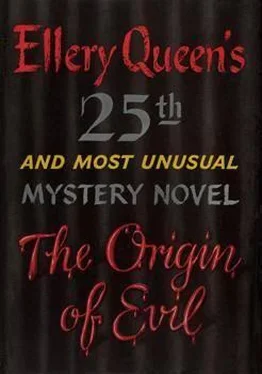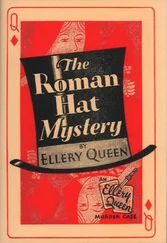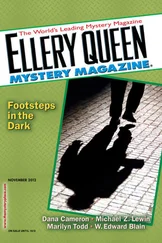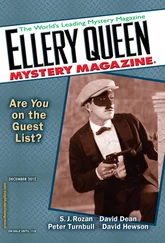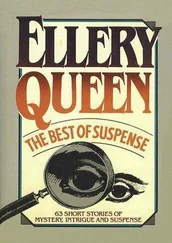“To death,” said Priam. “To death. He’s dead!.. But it was self-defense. You witnessed it ― if you witnessed it... He pussyfooted into my room here. I heard him come in. I made believe I was sleeping. Oh, I was ready for him!” His voice cracked. “Didn’t you see him point the gun at me? I grabbed it, twisted his hand! It was self-defense―”
“We saw it all, Mr. Priam,” said Ellery in a soothing voice.
“Good, you saw it. He’s dead. Damn him, he’s deadl Wallace... Try to kill me, would he? By God, it’s over. It’s over.”
“Yes,” Keats was saying into the phone. “When? Okay, no hurry.” He hung up.
“You heard Mr. Queen,” Priam babbled. “He saw it all, Lieutenant―”
“I know.” Keats went over to the blanket and lifted one corner. Then he dropped the blanket and took out a cigaret and lit it. “We’ll have to wait.” He inhaled.
“Sure, yes, Lieutenant.” Priam fumbled with something. The upper half of his bed rose, the lower sank, to form the chair. He groped. “A drink,” he said. “You join me? Celebration.” He guffawed. “Besides, I’m a little wobbly.”
Ellery was wandering around, pulling at an ear, rubbing the back of his neck. There was a ridge between his eyes.
Keats kept smoking and watching him.
“I’ve got to hand it to him,” Priam was saying, busy with a bottle and a glass. “Alfred Wallace... Must have had his nose fixed. I never recognized him. Smooth, smooth operator. Gets right on the inside. Laughing up his sleeve all the time! But who’s laughing now? Here’s to him.” He raised the glass, grinning, but the wild animal was still in his eyes. He tossed the whisky off. When he set the glass down, his hand was no longer shaking. “But there he is, and here I am, and it’s all over.” His head came down, and he was silent.
“Mr. Priam,” said Ellery.
Priam did not reply.
“Mr. Priam?”
“Hey?” Priam looked up.
“There’s one point that still bothers me. Now that it’s over, would you straighten me out on it?”
Priam looked at him. Then, deliberately, he reached for the bottle and refilled his glass.
“Why, Mr. Queen, it all depends,” he said. “If you expect me to admit a lot of guff ― with maybe a stenographer taking it all down from my terrace ― you can save your wind. All right, this man was after me. No idea why, friends, except that he went crazy. On that voyage. Absolutely nuts.
“On the Beagle he went after me and my shipmate with a machete. We were off some dirty island and we jumped overboard, swam to the beach, and hid in the woods. Hurricane blew up that night and swept the Beagle out to sea. We never saw the ship or Adam again. Shipmate and me, we then found a treasure on that island and we finally got it off on a raft we made.
“Reason we laid low and changed our names to Hill and Priam was so Adam could never come back and claim one third of the treasure ― he’d been exploring that island. And maybe he’d still try to kill us even if he didn’t claim a third. That’s my story, friends. Not a crime in a cargo load.” He grinned and tossed off the second glassful. “And I’m sticking to it.”
Keats was regarding him with admiration. “It’s a lousy story, Priam, but if you stick to it we’re stuck with it.”
“Anything else, Mr. Queen...” Priam waved genially. “All you got to do is ask. What’s the point that’s been giving you such a bad time?”
“The letter Adam sent to Leander Hill,” said Ellery.
“The letter―?” Priam stared. “Why in hell would you be worrying about that?”
Ellery took a folded sheet of paper from his breast pocket.
“This is a copy of the note Hill found in the silver box on the beagle’s collar,” he said. “It’s been some time and perhaps I’d better refresh your memory by reading it aloud.”
“Go ahead.” Priam still stared.
“You believed me dead,” read Ellery. “ Killed, murdered. For over a score of years I have looked for you ― for you and for him. And now I have found you. Can you guess my plan? You’ll die. Quickly? No, very slowly. And so pay me back for my long years of searching and dreaming of revenge. Slow dying... unavoidable dying. For you and for him. Slow and sure ― dying in mind and in body. And for each pace forward a warning... a warning of special meaning for you ― and for him. Meanings for pondering and puzzling. Here is warning number one.”
“See?” said Priam. “Crazy as a bug.”
“Killed, murdered said Keats. “By a hurricane, Mr. Priam?” But he was smiling.
“That was his craziness, Lieutenant. I remember when he was steaming after us on deck, waving the machete around his head, how he kept yelling we were trying to murder him. All the time he was trying to murder us. Ask your brain doctors. They’ll tell you.” Priam swung about. “Is that what’s been bothering you, Mr. Queen?”
“What? Oh! No, not that, Mr. Priam.” Ellery scowled down at the paper. “It’s the phrasing.”
“The what?”
“The way the message is worded.”
Priam was puzzled. “What’s the matter with it?”
“A great deal is the matter with it, Mr. Priam. I’ll go so far as to say that this is the most remarkable collection of words I’ve ever been privileged to read. How many words are there in this message, Mr. Priam?”
“How the devil should I know?”
“Ninety-nine, Mr. Priam.”
Priam glanced at Keats. But Keats was merely smoking with the gusto of a man who has denied himself too long, and there was nothing on Ellery’s face but concern. “So it’s got ninety-nine words. I don’t get it.”
“Ninety-nine words, Mr. Priam, comprising three hundred and ninety-seven letters of the English alphabet.”
“I still don’t get it.” A note of truculence crept into Priam’s heavy voice. “What are you trying to prove, that you can count?”
“I’m trying to prove ― and I can prove, Mr. Priam ― that there’s something wrong with this message.”
“Wrong?” Priam’s beard shot up. “What?”
“The tools of my business, Mr. Priam,” said Ellery, “are words. I not only write words of my own, but I read extensively ― and sometimes with envy ― the words of others. So I consider myself qualified to make the following observation: This is the first time I’ve ever run across a piece of English prose, deathless or otherwise, made up of as many as ninety-nine words, consisting of almost four hundred individual characters, in which the writer jailed to use a single letter T.”
“Single letter T” repeated Priam. His lips moved after he stopped speaking, so that for a moment it looked as if he were chewing something with a foreign and disagreeable taste.
“It took me a long time to spot that, Mr. Priam,” continued Ellery, walking around the body of Alfred Wallace. “It’s the sort of thing you can’t see because it’s so obvious. When we read, most of us concentrate on the sense of what we’re reading, not its physical structure. Who looks at a building and sees the individual bricks? Yet the secret of the building lies precisely there. There are twenty-six basic bricks in the English language, some of them more important than the rest. There’s no guesswork about those bricks, Mr. Priam. Their nature, their usability, their interrelation-ships, the frequency of their occurrence have been determined as scientifically as the composition of stucco.
“Let me tell you about the letter T, Mr. Priam,” said Ellery.
“The letter T is the second most frequently used letter in the English language. Only E occurs more frequently. T is the number two brick of the twenty-six.
Читать дальше
